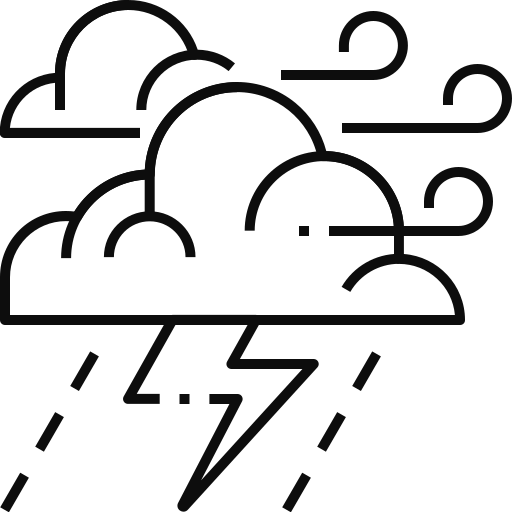Storms & Gales
Follow these steps to limit damage and stay safe during periods of stormy weather.
Before the Storm
- Secure any loose objects around your home and garden to stop them from blowing into windows and damaging your home.
- Close and fasten doors, windows and shutters around the property taking extra care to make sure large doors such as garages are secure.
- Close loft hatches or doors leading to the roof space.
- If possible park vehicles in a garage or keep them well away from buildings or trees.
During the Storm
- Try to stay indoors.
- Do not go out to repair damage whilst the storm is in progress.
- If possible enter and leave your home on the sheltered side.
- Take care whilst driving especially on exposed routes or if driving a high sided vehicle. Delay your journey or choose a different route if possible.
After the Storm
- Contact your Insurance company if there has been damage to your property or premises.
- Don’t touch any cables that have been blown down.
- Make sure any vulnerable neighbours or relatives are safe and help them make arrangements for any repairs.
View more advice on severe weather and check for weather warnings on the Met Office website. http://www.metoffice.gov.uk/
Power Failures
Severe weather can lead to loss of power supply. If power supplies are affected for a long period of time then it is important to be aware of those people in the community who are vulnerable and may need your help.
If you experience a power cut you should call 105.
For more information visit www.powercut105.com.
In the event of a power cut there are some simple precautions you can take:
- If electricity is crucial for any medical equipment you have, please contact your Electricity Supplier at any time as they may be able to put you on their Priority Register for assistance during any power outage.
- Make sure you have multiple torches along with extra batteries.
- Keep a plug-in telephone that does not require electricity – cordless phones won’t be able to make phone calls once the batteries are dead.
- Keep fridges and freezers closed, with a blanket over as they will stay cold for many hours.
- Keep important documents safe and handy.
- Look out for elderly neighbours and ensure they are prepared for a possible power cut.
- Switch off appliances – turn off items such as irons, ovens, electric fires and fryers as they could pose a hazard if the power comes back on when you are not there.
- If your power goes off unexpectedly, check to see if your neighbours still have electricity. If their power is also off don’t assume that the supplier has already been notified – always call to let them know.
- If your neighbours still have power but your home doesn’t, it’s likely there is a problem with the fuses or trip switches in your home.
Heatwave
Whilst most people will be looking forward to warmer weather over the summer, extreme heat can be dangerous and has the potential to affect health.
The current risk of a severe heatwave in Wales is relatively low, however during relatively mild heat waves, death rates are significantly raised in this country.
Who is at most risk?
- Older people, especially those over 75 and living either on their own or in a care home;
- People with chronic illness;
- Babies & small children.
Health risks
In a severe heatwave you may suffer from heat exhaustion or heatstroke. Both of which require urgent treatment.
Visit the NHS website http://www.nhs.uk/Livewell/Summerhealth/Pages/Heatwave.aspx
for more information and the symptoms of heat exhaustion and heatstroke.
What you and your family/carer can do
- Check that windows can be opened to ventilate rooms especially at night;
- Shade windows during the day by drawing curtains or blinds especially if they receive direct sunlight;
- Check you are in the coolest room possible;
- Use an electric fan to circulate the air;
- Make sure you have access to cool non alcoholic drinks, and that you drink regularly;
- Spray cool water on yourself or have a flannel to cool you down;
- Plan cold menus and include foods with a high water content such as fruit and salads;
- Wear loose cotton clothing and wear a sun hat if you go outdoors.
- Looking after yourself and others during a heatwave
- Keep out of the heat by avoiding the hottest part of the day (11am – 3pm). Keep strenuous outdoor activities such as sport, DIY, to cooler parts of the day. If you go out try to stay in shaded areas, wear a sun hat, light loose clothes, apply sunscreen, and remember to take plenty of water with you.
- Try to stay cool by staying inside in the coolest part of the building. Close curtains in rooms that get a lot of sun. Close windows during the day and open them at night when its cooler outside. Take cool showers or baths, and splash yourself several times a day with cold water.
- •Drink regularly, even if you don’t feel particularly thirsty avoiding alcohol, tea and coffee.
- Seek advice if you have any concerns Contact your doctor or a pharmacist if you’re worried about your health during a heatwave, especially if you are taking medication, or have any unusual symptoms.
Stay up to date with the weather
During the winter and when extreme weather conditions and low temperatures are expected, be prepared by keeping yourself informed and up to date with the latest situation.
The Met Office provide warnings to the public and emergency responders of severe and hazardous weather, which has potential to cause danger to life or widespread disruption through the National Severe Weather Warning Service.
The latest weather information can be found at:
Met Office http://www.metoffice.gov.uk/public/weather
BBC – Weather http://www.bbc.co.uk/weather/
Also check with Floodline Warnings Direct on 0345 9881188 to see if any flood warnings have been issued for your area. Flood warnings will also be broadcast on TV, local radio and the Natural Resources Wales website. https://naturalresources.wales/flooding/?lang=en
Severe Weather Warnings
For up to date information on Severe Weather warnings currently in force click on the link below:
Travelling Safely
Traffic and public transport information can be found using the following links:
During severe weather roads can quickly become hazardous, blocked and inaccessible. Monmouthshire County Council co-ordinates the clearing of roads and tries to keep the primary route network open. (Motorways {M4, M48} and trunk roads are owned by the Welsh Government). Minor and residential roads may remain difficult to negotiate so drive with care.
Driving in winter
Drive slowly, with smooth, gentle application of accelerator, steering and, particularly, brakes.
Beware of black ice. If the vehicle starts to skid, gently lift off the accelerator and steer in the direction of the skid.
If the road has not been gritted, be wary of driving in the wheel tracks of other vehicles as it is likely to be more icy.
In poor visibility use dipped headlights. Take particular care to watch for snowdrifts. Watch out for cyclists and pedestrians.
Allow plenty of time for your journey and make sure you have a full tank of fuel.
Make sure your windscreen and windows are clear and make sure the windscreen washer bottle is regularly topped up, and contains the correct ration of screen wash.
Make sure you carry a spade, wellies, torch and a mobile phone. Keep a bottle of water and high-energy food in case you break down. Carry extra clothing, including a warm coat, gloves and hat.
Winter maintenance vehicles are extremely powerful so maintain a safe distance behind them, and take great care when overtaking.
AA winter driving advice – https://www.theaa.com/driving-advice/seasonal/winter
RAC winter driving advice – http://www.rac.co.uk/drive/advice/winter-driving/
Additional information and advice on driving in adverse weather conditions is available in the Highway Code or by visiting GOV.UK – Driving in adverse weather conditions.
For information on current road conditions during emergencies call:
AA Roadwatch – call 84322 from a mobile or 0906 88 84322 from a land line for the latest travel news.
or visit
Traffic Wales Information: www.traffic-wales.com
Gritting Routes
For details of the council’s gritting routes: http://www.monmouthshire.gov.uk/gritting-routes




